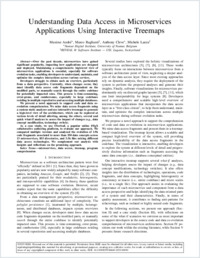Understanding data access in microservices applications using interactive treemaps
- André, Maxime Namur Digital Institute, University of Namur, Belgium
- Raglianti, Marco ORCID Istituto del software (SI), Facoltà di scienze informatiche, Università della Svizzera italiana, Svizzera
- Cleve, Anthony Namur Digital Institute, University of Namur, Belgium
- Lanza, Michele ORCID Istituto del software (SI), Facoltà di scienze informatiche, Università della Svizzera italiana, Svizzera
- 2025
Published in:
- IEEE/ACM 33rd International Conference on Program Comprehension (ICPC). - 2025, p. 216-220
English
Over the past decade, microservices have gained significant popularity, impacting how applications are designed and deployed. Maintaining a comprehensive high-level view of microservices applications is essential, especially for software evolution tasks, enabling developers to understand, maintain, and optimize the complex interactions across various services. Developers struggle to obtain such an overview, particularly from a data perspective. Currently, when changes occur, they must identify data access code fragments dependent on the modified parts, or manually search through the entire codebase for potentially impacted ones. This process is time-consuming, error-prone, and cumbersome, especially in large codebases residing in multiple repositories and accessing multiple databases. We present a novel approach to support code and data coevolution comprehension. We mine data access fragments using a custom static analyzer and use interactive treemaps to generate a high-level view of the architecture, which can be explored at various levels of detail allowing, among the others, several and quick what-if analyses to assess the impact of changes (e.g., data concept modification, technology switch). As a case study, we use Overleaf, a popular online LATEX collaborative authoring platform, to evaluate our approach. We compared multiple versions and analyzed the evolution of 1.9 k code fragments associated to more than 350 data concepts across 13 microservices, 855 directories, and 3.5 k files mixing different data access technologies. We complement our analysis with insights and reflections on the promising approach.
- Collections
- Language
-
- English
- Classification
- Computer science and technology
- License
-
Rights reserved
- Open access status
- green
- Identifiers
-
- DOI 10.1109/ICPC66645.2025.00030
- ARK ark:/12658/srd1332348
- Persistent URL
- https://n2t.net/ark:/12658/srd1332348
Statistics
Document views: 97
File downloads:
- Raglianti-Lanza_2025_IEEE_ICPC.pdf: 44
